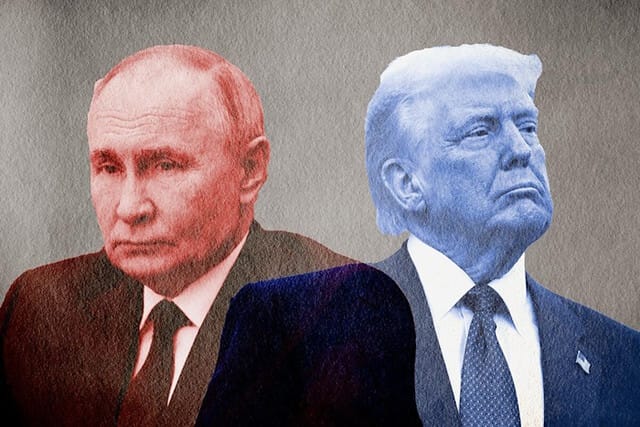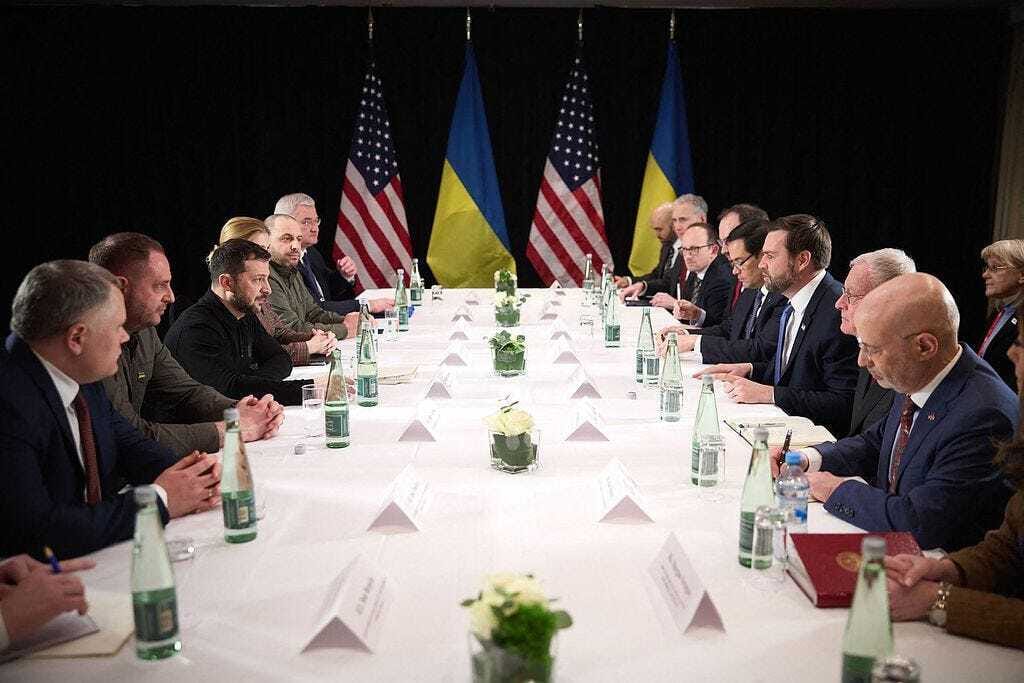- Stratagem
- Posts
- 🌎Beyond Borders Brief Weekly Edition #2🌎
🌎Beyond Borders Brief Weekly Edition #2🌎
📝The Trump Administration shifts away from Munich and Brussels towards Moscow and offers conflicting rhetoric on Taiwan while Russia’s footprint expands in the Sahel. 📌

🚨What We’re Watching🎥

Vladimir Putin (Left) & Donald Trump (Right)
📍Trump-Putin Call and Russo-Ukrainian War Negotiations Signals New U.S. Foreign Policy Strategy
📚Facts: On February 18th delegations from the United States and Russia convened to negotiate an end to the Russo-Ukrainian War in Riyadh, Saudi Arabia. The meeting came after a 90-minute phone conversation on February 12th where Trump and Putin agreed to cooperate to end the war. Secretary of State Marco Rubio stated that both sides would restore staffing at their respective embassies, create teams tasked with Ukrainian peace operations, and explore diplomatic and economic relations. Russian Foreign Minister Sergey Lavrov echoed that the conversation in Riyadh was “very useful.” The negotiations in Riyadh excluded Ukraine and other European allies, provoking discontent primarily among the French and German regimes. These conversations were designed to precede a future in-person summit between Trump and Putin.
💭Analysis: The United States is taking a Russia-facing strategy to resolve the war in Ukraine against the wishes of Ukraine and the U.S. Nato allies. Rubio stated the U.S. changed its stance based on “geopolitical interest and some very unique economic opportunities.” The Trump Administration has neared the finalization of a deal with Ukraine to provide critical metals and minerals to reduce U.S. dependence on China and create the foundation for long-term U.S.-Ukraine relations. The Trump administration's antagonization of the Ukrainians and Détente-esque attitude with the Russians has cemented dealmaking and bold negotiating strategies as mainstays of “America First” foreign policy.
📍U.S. Department of State Does Not Deny Taiwanese Independence in Defiance of China’s Stance
📚Facts: The United States Department of State changed its website last week, deleting the phrase “we do not support Taiwan independence” as well as adding that the U.S. “will continue to support Taiwan’s meaningful participation in international organizations, including membership where applicable.” Chinese foreign ministry spokesman Guo Jiakun condemned the website change and accused the U.S. of leveraging support for Taiwan to suppress China. Taiwan split from communist China during the 1949 Chinese Civil War and set up a rival nationalist government in Taipei, which China seeks to reunify under the Chinese Communist Party. The reason for the website change remains unclear, but Secretary of State Marco Rubio has long supported Taiwan, advocating for legislation to sell U.S. weaponry to the island.
💭Analysis: The website change marks a subtle shift in America’s policy of strategic ambiguity toward Taiwan-China relations and potentially unprecedented support for Taiwanese independence. On February 24th, the U.S. changed its rhetoric on Russian responsibility for the Russo-Ukrainian war, removing language blaming Russian aggression for the conflict in a U.N. resolution. The U.S. inconsistent support for democratic countries’ independence demonstrates a potential American shift to improve relations with Russia as a means to counter China. Currently, China and Russia are working to undermine U.S. power through initiatives like reducing the global value of the dollar while backing revisionist autocracies like Iran and North Korea.
📍Russia Aids the Alliance of the Sahel States Expanding Their Influence in Africa
📚Facts: Russia aids the combat effectiveness of the Alliance of the Sahel States (AES) with equipment and Wagner mercenaries. The AES is a mutual defense pact established in 2023 by Mali, Niger, and Burkina Faso after different military juntas took control in each state. All three states are located in the Sahel region of northwest Africa and withdrew from ECOWAS, a political and economic union to promote integration and stability, on January 29, 2025. One reason for this withdrawal was the failure to address the insurgencies of terrorist groups linked to al-Qaeda and ISIS in the Sahel. The AES is opting for a Russian partnership to support their separation from ECOWAS and assist counterterrorism efforts, resulting in the deployment of military specialists and equipment to the states.
💭Analysis: Russian forces combating terrorism in the Sahel are replacing American and French influence in the region. The decision to separate from ECOWAS stems from the growing poverty, weak governance, and lack of resources, as the states rank low on the Human Development Index (Mali 188/193, Niger 189/193, Burkina Faso 185/193). Russia views the Sahel as a key opportunity to expand its global influence, particularly after the expulsion of Western forces there. This regional realignment weakens U.S. influence in a critical counterterrorism region, empowering rivals and destabilizing West Africa.
📍U.S. Skips Key UN Climate Meeting, Further Undermining Global Climate Leadership
📚Facts: The United States opted not to send an American delegation to the United Nations Intergovernmental Panel on Climate Change (IPCC) meeting next week in Hangzhou, China. The IPCC is the UN body responsible for producing reports evaluating and issuing policy recommendations on climate change. The Hangzhou meeting will include UN climate officials and delegations from 195 UN member nations, who will make crucial decisions on its upcoming 2029 report. The move is part of a broader Trump stop-work order for involvement in UN climate change assessments and comes in the wake of the recent executive order withdrawing the U.S. from the Paris Climate Accords.
💭Analysis: While the White House has not indicated whether the U.S. will permanently withdraw from the IPCC, the absence of an American delegation in Hangzhou further isolates the U.S. from global discussions on responding to climate change. This absence opens the door for other countries, such as China, to lead international efforts on climate change, undermining the United States’ leadership in multilateral institutions. It also threatens the ability of the U.S. to address climate change, an existential threat to national security. The potential loss of key financial support from the U.S. also risks weakening global climate efforts, as American support makes up over 25 percent of government funding for the IPCC.
👀Looking Ahead👀

U.S. Vice President JD Vance Meets With Ukrainian President Volodymyr Zelenskyy
📍Trouble in Paradise? U.S. - NATO Relations Imperiled After Munich Security Conference and Hegseth’s European Tour
📚Facts: On February 14th at the Munich Security Conference (MSC) Vice President JD Vance claimed that European democracy’s largest threats stemmed from their domestic politics, highlighting Europe’s silencing of its citizens’ freedom of speech. He also mentioned issues of mass migration into Europe and encouraged increased defense spending. At the conference’s closing ceremony, outgoing MSC Chairman Christoph Heugsen stated that the U.S. and Europe may no longer share common values. That same week, Defense Secretary Pete Hegseth toured Germany, Belgium, and Poland, during which he advocated against Ukraine joining NATO, for Europe to provide the majority of aid to Ukraine, and for Europe to increase their defense spending rather than continue relying on the United States security guarantees.
💭Analysis: The U.S.-NATO relationship is being tested as the U.S. relinquishes its role as the guarantor of European security and shifts its focus toward China and the Indo-Pacific. Vance and Hegseth’s comments provide insight into an “America First” foreign policy that prioritizes competition with China and stability in the Indo-Pacific. The Trump administration wants European nations to bolster their defense industrial base, defense budgets, military capabilities, and increase European responsibility for international security issues that primarily impact Europe. Some argue that last week’s events emphasized that the U.S. and Europe have different goals for the future of NATO. Others believe that Trump is using the Russia-Ukraine conflict and his relationship with Putin to force European nations to reinvigorate a latent European defense ecosystem.
💡The TSI Insider💡

TSI Members Enjoying Safeway’s Finest Pasta
On Sunday evening the TSI Events Team hosted our first monthly pasta night! Chefs Elisabeth, Kalee, Chloe, and Felix cooked up some delicious pasta with bolognese, pesto, and garlic bread all to the sweet sounds of Spotify’s signature Italian restaurant playlist! This is one of the many ways our organization works to build community and fellowship.

Ground Breaking Diplomacy
🧣🦫One For The Road🚗🏝️
Punxsutawney Phil saw his shadow on Groundhog Day meaning six more weeks of winter. TSI members are looking forward to our spring break next week and escaping from the District’s cold temperatures. BBB writers are traveling to the Dominican Republic, Florida, Boston, Detroit, New York, and Vermont!
Not a subscriber? Click here to subscribe!
See You On Thursday For 🌊The Deep Dive!🌊
This week’s newsletter brought to you by the Beyond Borders Brief staff. Connect with us on social media to pose questions, comments, or feedback. Click here to learn more about TSI.
Reply